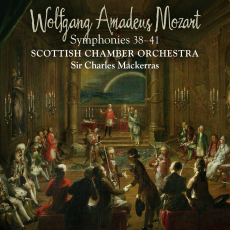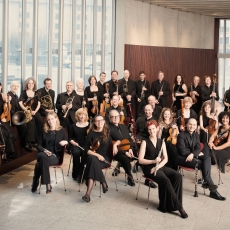Mozart Symphonies - SCO & Sir Charles Mackerras - MusicalCriticism.com
Over the last four weeks, this new recording of Mozart's final four symphonies by Sir Charles Mackerras and the Scottish Chamber Orchestra has enjoyed lavish praise from all the newspaper critics, almost without exception in fact. The Times, Sunday Times, Guardian, The Observer, The Sunday Telegraph and no doubt various others have described it as either the best account or equal to the best accounts of the works on record and awarded it five stars across the board.
For me the story isn't quite so simple, because here we have four very different and very difficult works; some of them really are performed with extraordinary results, but some of them aren't so persuasive.
Now in his ninth decade, Mackerras knows his Mozart back to front and has recorded some of these works several times already; his collaboration with the SCO goes back many years and has already reaped numerous excellent Mozart recordings.
Yet to me, Sir Charles also seems like a man in a great hurry, which can be both enthralling and unsettling. For instance, the lively tempo for the Allegro of the first movement of the 'Prague' Symphony (No. 38 in D, K.504) is the perfect foil for the grave Adagio it follows, but the Finale is rushed: the marking may be Presto but the ambitious tempo at which Mackerras embarks on the movement is not always maintained, causing the musicians to speed up again occasionally to compensate, and one can feel sometimes that by having to rush, the musicians (especially the wind instruments) lose the breadth of expressivity they show in their gorgeous rendition of the Andante.
Nor am I entirely convinced by Symphony No 39 in E flat, K.543, which finds Mozart at his most sublime - but not Mackerras. The Allegro of the first movement leans too heavily on the timpani and lower strings at the expense of the clarinet, a surprise in light of Sir Charles' mention of that instrument's limpid and serene timbre in his brief but interesting essay in the liner booklet. Even more surprising is the matter-of-fact quality of the Andante con moto, which Mackerras seems not to want to be a 'slow' movement. To my ears it's just too fast and jaunty an interpretation, especially the dotted rhythms in the main theme which could be a lot smoother; a shame, because the darker colours of the central section come out with a riveting intensity that probably outdoes any other recording I can put my hands on. Similarly, the Trio is beautifully played, but the Menuetto is too heavily done, with such an emphasis on the bass that the music seems to jerk along. Assuming it's not just a fault on my copy of the CD, there's also a small but clearly audible squeaky background noise (from a chair in the studio?) at 3'29, which really ought to have been removed; otherwise, in general I find the sound excellent and vibrant. The Finale is far more compelling, again played at quite a lick but still allowing plenty of nuance from the impeccable SCO strings and woodwinds.
On to the great Symphony in G minor, K.550, and more surprises are in store. Reactions to this performance will perhaps vary according to personal taste: does it bother you that Mackerras avoids the dark colours traditionally associated with the outer movements? Speaking personally, it does. Far from being the most entrancing recording of this symphony currently available, the first movement in particular strikes me instead as curiously snatched-at, raced-through and homogenised. A work normally nail-biting in its force is played with far less stress on the accented dissonances than is often the case, and the slurs which pervade the main theme could be far more clearly articulated. I just long for an edge-of-the-seat excitement which is never delivered. On the other hand, the slow movement is beautifully played, the lush wind colours coming through beautifully, the distinctive timbre of the natural horns blending well with the carefully handled string vibrato (Mackerras' approach mixes modern and period styles, often to great effect, though the timbre of a period orchestra using gut strings and so on is inevitably absent). Towards 8'00 there's again a tendency to rush, but the range of colours more than makes up for it. However, I find the Minuet very disappointing, taken at a one-in-a-bar pace and very choppily articulated, rather than having the character of a court dance. The biggest problem is that, once again, the orchestra does not maintain the ambitious tempo of the beginning, and the Trio is much slower (to its enhancement, in fact: the musicians can actually enjoy the elegant horn, cello, flute and clarinet interplay, all of which is missed in the Menuetto). Again, the Finale is extremely fast in tempo, which will be to some people's taste, but to me there's such a scramble to keep up that some detail and refinement is lost; I find particularly that the second two bars of each phrase of the first theme (the turn-like figure) is nearly always faster than the first two, and not necessarily to expressive effect. One can only marvel at the talents of the players of the SCO, who achieve some remarkable moments, and Mackerras achieves some lovely introspection in the quieter passages - a stunning clarinet solo, for instance - but on the whole I feel that various conductors from previous decades have got to the heart of this piece more convincingly than Mackerras, even if they don't have his insight regarding performance practice.
For me, the 'Jupiter' Symphony gets the best rendition of the four on this disc. The sheer exuberance of Mackerras' approach to Mozart suits this glorious C major symphony to perfection. He leads the Scottish players in a fantastic game of musical fun, creating a performance of uplifting dynamic contrasts, relishing Mozart's textural invention and bringing out all kinds of hitherto unnoticed details. The loving approach to the Andante makes this as satisfying a performance of the movement as you could hope to hear, with vibrato used as an expressive tool in the strings and the wind instruments creating tension and spiciness. Both here and in the Menuetto, it helps that Mackerras opts for tempos which, if not exactly slow, are slower than the outer movements and create the contrasts between movements which the composer surely intended. The sway of the Menuetto is literally delicious, enhanced by the natural trumpets in the Trio, while the Finale really is as thrilling as any Mozart symphonic recording I've heard. The excellent close recording of the instruments allows Mackerras to retain the orchestra's chamber configuration and the free abandon that a small number of excellent players can create. Has the devilishly tricky fugal development ever been so blisteringly performed? I doubt it; and even the movement's problematic coda is sailed through with apparent ease and logic here.
Mackerras remains one of my favourite conductors, his ability to convince in any repertoire from Handel to Martinu, Mozart to Verdi and Beethoven to Janacek surely unrivalled by any other living conductor, and I cannot wait for his Covent Garden Figaro and Don Giovanni this year. But while the best of this bargain-priced two-disc set really is as good as it gets, the middle two symphonies in particular should perhaps be approached with a more critical ear than has so far been the case in some quarters.

